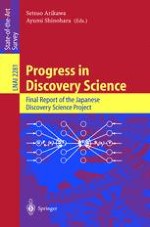2002 | OriginalPaper | Buchkapitel
Computing Optimal Hypotheses Efficiently for Boosting
verfasst von : Shinichi Morishita
Erschienen in: Progress in Discovery Science
Verlag: Springer Berlin Heidelberg
Enthalten in: Professional Book Archive
Aktivieren Sie unsere intelligente Suche, um passende Fachinhalte oder Patente zu finden.
Wählen Sie Textabschnitte aus um mit Künstlicher Intelligenz passenden Patente zu finden. powered by
Markieren Sie Textabschnitte, um KI-gestützt weitere passende Inhalte zu finden. powered by
This paper sheds light on a strong connection between AdaBoost and several optimization algorithms for data mining. AdaBoost has been the subject of much interests as an effective methodology for classification task. AdaBoost repeatedly generates one hypothesis in each round, and finally it is able to make a highly accurate prediction by taking a weighted majority vote on the resulting hypotheses. Freund and Schapire have remarked that the use of simple hypotheses such as singletest decision trees instead of huge trees would be promising for achieving high accuracy and avoiding overfitting to the training data. One major drawback of this approach however is that accuracies of simple individual hypotheses may not always be high, hence demanding a way of computing more accurate (or, the most accurate) simple hypotheses effciently. In this paper, we consider several classes of simple but expressive hypotheses such as ranges and regions for numeric attributes, subsets of categorical values, and conjunctions of Boolean tests. For each class, we develop an efficient algorithm for choosing the optimal hypothesis.
